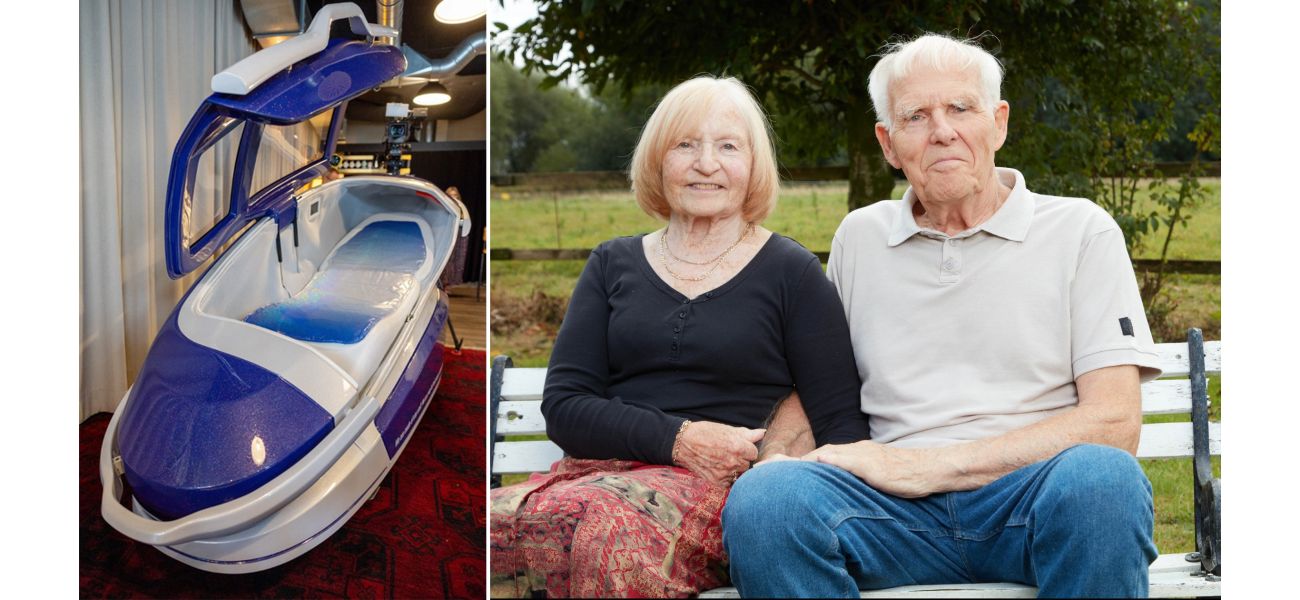Elderly opt for dual suicide chamber rather than waiting for NHS care.
I want to avoid being in a nursing home, unable to control my bodily functions and lying in bed.
September 8th 2024.

Christine and Peter Scott, a couple who have been married for 46 years, have made a decision that has caught many by surprise. Instead of spending their last days together in a retirement home or in the care of the NHS, they have chosen to die together in a Sarco suicide pod. Their reasoning? They don't want to be "trapped by infirmity and pain" in their old age.
Peter, an 86-year-old retired RAF engineer, cannot imagine living without his wife Christine, an 80-year-old former nurse who has been diagnosed with early-stage vascular dementia. It's not just the thought of being alone that has driven them to make this decision, but also the fear of watching each other's health decline. As Peter puts it, "The idea of watching the slow degradation of Chris's mental abilities in parallel to my own physical decline is horrific to me."
They have had long and happy lives, but the thought of spending their last days in a state of physical and mental decline is something they cannot accept. As Peter explains, "The chances of getting prompt NHS treatment for the ailments of old age seem pretty remote so you end up trapped by infirmity and pain. I don't want to go into care, to be lying in bed dribbling and incontinent – I don't call that a life." And to make matters worse, they fear that the government will swoop in and take their savings and their house to pay for their care.
Their decision to end their lives together has not been an easy one. They first met at a jazz club and have been married for 46 years. They have six grandchildren and have had a happy and fulfilling life together. But as Christine says, "Here we are in old age and it does not do nice things to you." They want to be in control of their own lives and their own deaths.
Instead of being able to make this choice in their home country, they must travel to Switzerland where assisted dying has been legal since 1942. They plan to use the Sarco suicide pod, created by Australian-born Philip Nitschke, also known as "Doctor Death." The pod works by rapidly replacing oxygen with nitrogen, causing a peaceful and euphoric death. However, critics have called it a "glorified gas chamber" and there are concerns about the potential for a painful death if it malfunctions.
Despite the controversy surrounding the Sarco, the Scotts are determined to use it to end their lives together. They have already planned their last days, including a walk in the Swiss Alps, a last supper of fish and a bottle of Merlot, and a playlist of their favorite songs. And when they are gone, they want to be cremated and have their ashes scattered in the graveyard of their local church.
Their children have reluctantly agreed to respect their parents' wishes, despite initially encouraging them to move into a retirement home. As Christine says, "It's a lovely life but I have this diagnosis, and that's crystallised our thinking. Medicine can slow vascular dementia but it can't stop it."
Their decision has not been an easy one for their children to accept, but they have come to understand and respect their parents' wishes. As Peter says, "I've said to her, 'You make the decision and I'll be with you'. Death holds no problem for me whatsoever. I'd just give her a big hug and say, 'Hope to see you later'."
Their story has sparked a debate about assisted dying laws in the UK, with Prime Minister Keir Starmer promising to allow a free vote for Labour MPs. The Scotts hope that their choice will bring attention to the issue and give others the right to choose how they want to end their lives.
In the meantime, for those struggling with thoughts of ending their own lives, there are organizations like the Samaritans and PAPYRUS Prevention of Young Suicide UK that offer emotional support and resources. As the Scotts have shown, it is important to have open and honest conversations about death and the right to choose how we want to die.
Peter, an 86-year-old retired RAF engineer, cannot imagine living without his wife Christine, an 80-year-old former nurse who has been diagnosed with early-stage vascular dementia. It's not just the thought of being alone that has driven them to make this decision, but also the fear of watching each other's health decline. As Peter puts it, "The idea of watching the slow degradation of Chris's mental abilities in parallel to my own physical decline is horrific to me."
They have had long and happy lives, but the thought of spending their last days in a state of physical and mental decline is something they cannot accept. As Peter explains, "The chances of getting prompt NHS treatment for the ailments of old age seem pretty remote so you end up trapped by infirmity and pain. I don't want to go into care, to be lying in bed dribbling and incontinent – I don't call that a life." And to make matters worse, they fear that the government will swoop in and take their savings and their house to pay for their care.
Their decision to end their lives together has not been an easy one. They first met at a jazz club and have been married for 46 years. They have six grandchildren and have had a happy and fulfilling life together. But as Christine says, "Here we are in old age and it does not do nice things to you." They want to be in control of their own lives and their own deaths.
Instead of being able to make this choice in their home country, they must travel to Switzerland where assisted dying has been legal since 1942. They plan to use the Sarco suicide pod, created by Australian-born Philip Nitschke, also known as "Doctor Death." The pod works by rapidly replacing oxygen with nitrogen, causing a peaceful and euphoric death. However, critics have called it a "glorified gas chamber" and there are concerns about the potential for a painful death if it malfunctions.
Despite the controversy surrounding the Sarco, the Scotts are determined to use it to end their lives together. They have already planned their last days, including a walk in the Swiss Alps, a last supper of fish and a bottle of Merlot, and a playlist of their favorite songs. And when they are gone, they want to be cremated and have their ashes scattered in the graveyard of their local church.
Their children have reluctantly agreed to respect their parents' wishes, despite initially encouraging them to move into a retirement home. As Christine says, "It's a lovely life but I have this diagnosis, and that's crystallised our thinking. Medicine can slow vascular dementia but it can't stop it."
Their decision has not been an easy one for their children to accept, but they have come to understand and respect their parents' wishes. As Peter says, "I've said to her, 'You make the decision and I'll be with you'. Death holds no problem for me whatsoever. I'd just give her a big hug and say, 'Hope to see you later'."
Their story has sparked a debate about assisted dying laws in the UK, with Prime Minister Keir Starmer promising to allow a free vote for Labour MPs. The Scotts hope that their choice will bring attention to the issue and give others the right to choose how they want to end their lives.
In the meantime, for those struggling with thoughts of ending their own lives, there are organizations like the Samaritans and PAPYRUS Prevention of Young Suicide UK that offer emotional support and resources. As the Scotts have shown, it is important to have open and honest conversations about death and the right to choose how we want to die.
[This article has been trending online recently and has been generated with AI. Your feed is customized.]
[Generative AI is experimental.]
0
0
Submit Comment





